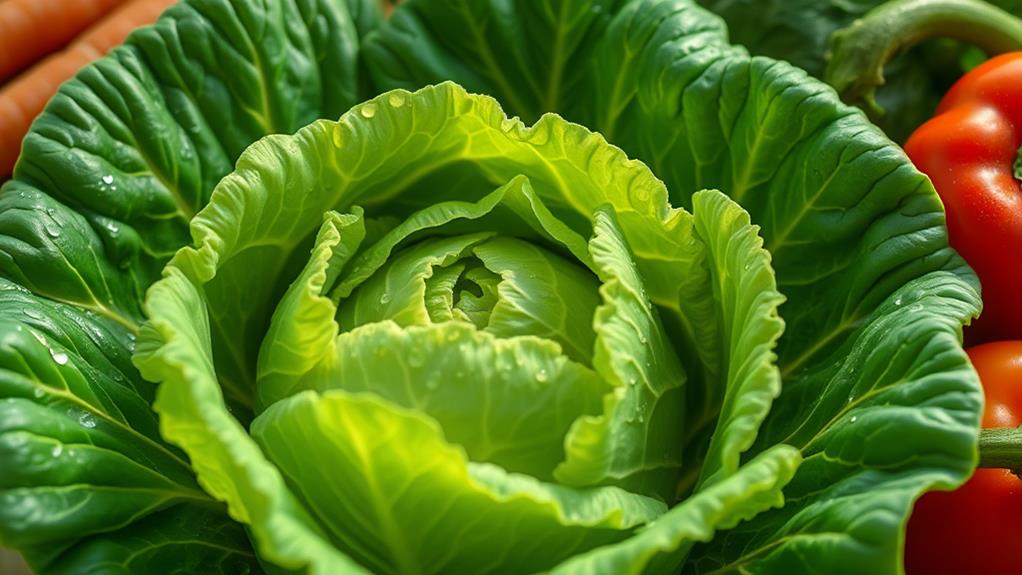You might underestimate cabbage, but this humble vegetable packs a punch when it comes to health benefits. From its impressive anti-inflammatory properties to its role in supporting digestive health, cabbage is more than just a side dish. It can aid in heart health and even contribute to cancer prevention. Curious about how this versatile vegetable can transform your well-being? Let's explore eleven compelling reasons why incorporating cabbage into your diet might be one of the best choices you can make for your health.
Nutritional Profile of Cabbage
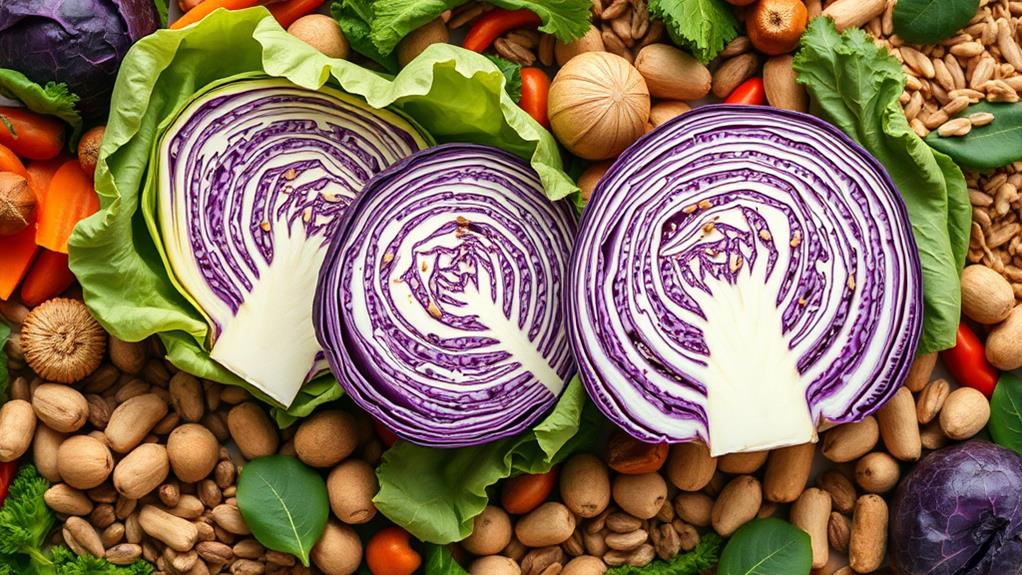
Cabbage, often seen in salads and coleslaw, packs a powerful nutritional punch. This leafy green is low in calories, with just 22 calories per cup, making it a fantastic choice for anyone watching their weight.
When you munch on a cup of chopped raw cabbage, you're treating yourself to a whopping 54% of your daily vitamin C and 85% of your vitamin K. These vitamins are essential for your immune system and help your blood clot when you get a boo-boo!
But that's not all—cabbage also gives you over 2 grams of dietary fiber per cup. This fiber helps with digestion and keeps you feeling full, which is always a plus.
Plus, it's loaded with antioxidants like sulforaphane and kaempferol, which can help fight oxidative stress and may lower your cancer risk.
Don't forget about the important minerals, like potassium and magnesium, which support your heart health and help regulate blood pressure.
Anti-Inflammatory Properties
Eating cabbage can be a delicious way to fight inflammation and support your health. This crunchy veggie is packed with amazing anti-inflammatory properties that can really help you out.
Cabbage, especially the colorful red variety, contains powerful antioxidants like anthocyanins and glucosinolates. These compounds work hard to reduce inflammation and lower your risk of chronic diseases like heart disease and cancer.
When you munch on cruciferous vegetables, including cabbage, studies show you might notice lower levels of inflammatory markers in your blood. This means your body could be feeling better overall!
Plus, the sulforaphane in cabbage not only helps reduce tissue swelling but also gives a boost to your immune system.
Digestive Health Benefits
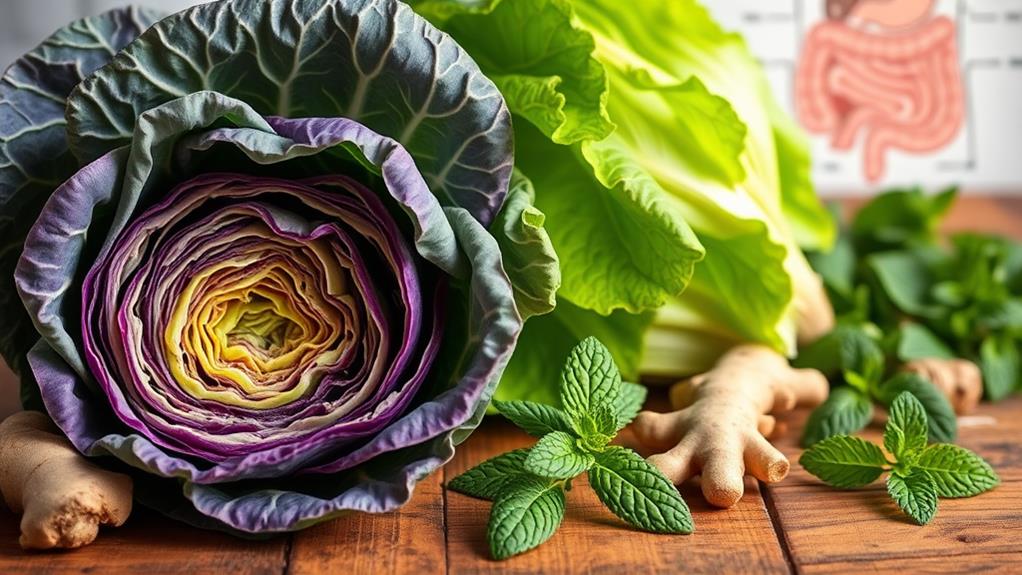
Packed with dietary fiber, cabbage offers impressive benefits for digestive health. This leafy green packs about 1 gram of fiber per 10 calories, which is fantastic for promoting regular bowel movements and preventing constipation. The insoluble fiber in cabbage adds bulk to your stool, making it easier to pass and helping you avoid pesky digestive disorders.
But that's not all! Cabbage contains compounds that may strengthen your stomach and intestinal lining, potentially easing symptoms of digestive issues like ulcers.
Plus, if you enjoy fermented foods like sauerkraut or kimchi, you're in for a treat! The fermentation process introduces beneficial probiotics, which help support nutrient absorption and digestion. These little guys are great for your gut health.
Regularly munching on cabbage can even lead to healthier gut bacteria. When your gut bacteria are happy, your overall digestive health gets a boost!
Heart Health Support
Regularly including cabbage in your diet can greatly support heart health. This crunchy veggie is packed with antioxidants, especially in red cabbage, which can help reduce the risk of heart disease.
You see, these antioxidants can fight inflammation, which is a sneaky enemy of your cardiovascular system. Plus, cabbage is a fantastic source of fiber, which works hard to lower LDL (bad) cholesterol. By binding with cholesterol in your gut, it prevents those bad guys from sneaking into your bloodstream.
Don't forget about potassium! Just one cup of red cabbage gives you about 6% of your daily potassium needs. This mineral is key for keeping your heart happy and countering the effects of sodium.
Regularly munching on cabbage can also help decrease mortality from heart disease—pretty impressive, right?
Blood Pressure Regulation
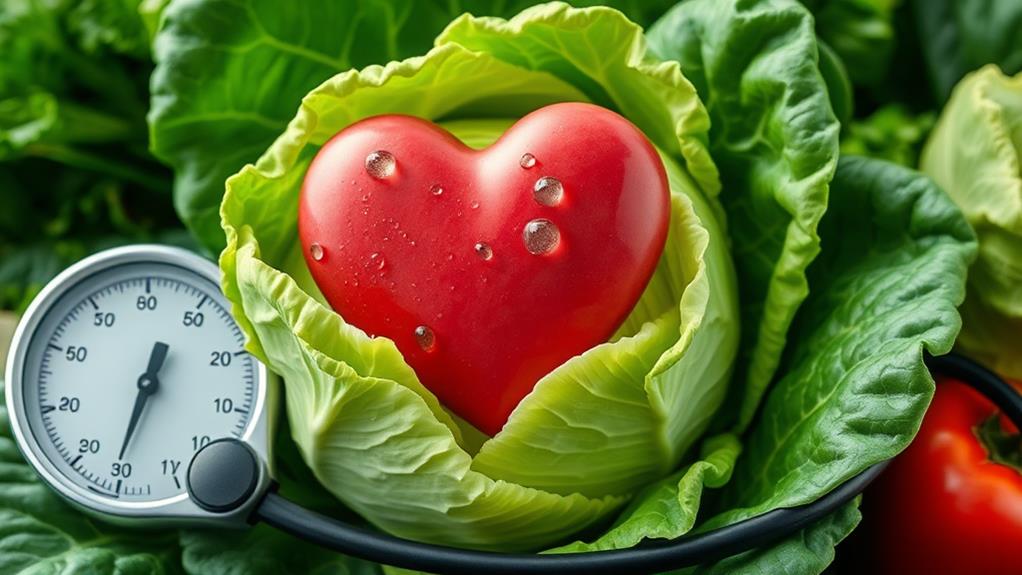
When it comes to managing blood pressure, incorporating cabbage into your meals can be a smart choice. This crunchy veggie is packed with potassium, which helps counteract sodium's effects, making it easier for your body to keep blood pressure in check. Just two cups of cabbage give you about 9% of your daily potassium needs!
But that's not all—cabbage is also rich in fiber, which plays a role in lowering LDL cholesterol levels. Lowering that pesky cholesterol is great for heart health and can also help regulate your blood pressure.
Plus, the anti-inflammatory properties in cabbage support overall vascular health, reducing the risk of cardiovascular disease.
If you're a fan of red cabbage, you'll love this: it contains anthocyanins that are linked to a lower risk of heart disease, which keeps blood pressure levels steady.
And let's not forget glucosinolates, which may also boost your cardiovascular health.
Cholesterol Management
Cabbage's cholesterol-lowering prowess makes it a valuable addition to your diet. This leafy green is packed with soluble fiber, which binds to cholesterol in your gut, helping to lower those pesky LDL (bad) cholesterol levels. So, when you munch on cabbage, you're doing your heart a favor!
A typical 2-cup serving of cabbage gives you about 9% of your daily potassium, which is great for keeping your blood pressure in check and supporting heart health. Plus, cabbage is loaded with antioxidants and anti-inflammatory properties, making it a superhero against cardiovascular disease.
What's more, the phytosterols found in cabbage compete with dietary cholesterol for absorption in your intestines. This means that the more you eat, the better your cholesterol management gets!
Research shows that eating more cruciferous vegetables like cabbage can lead to improved lipid profiles, so you can wave goodbye to high cholesterol levels.
Cancer Prevention Potential
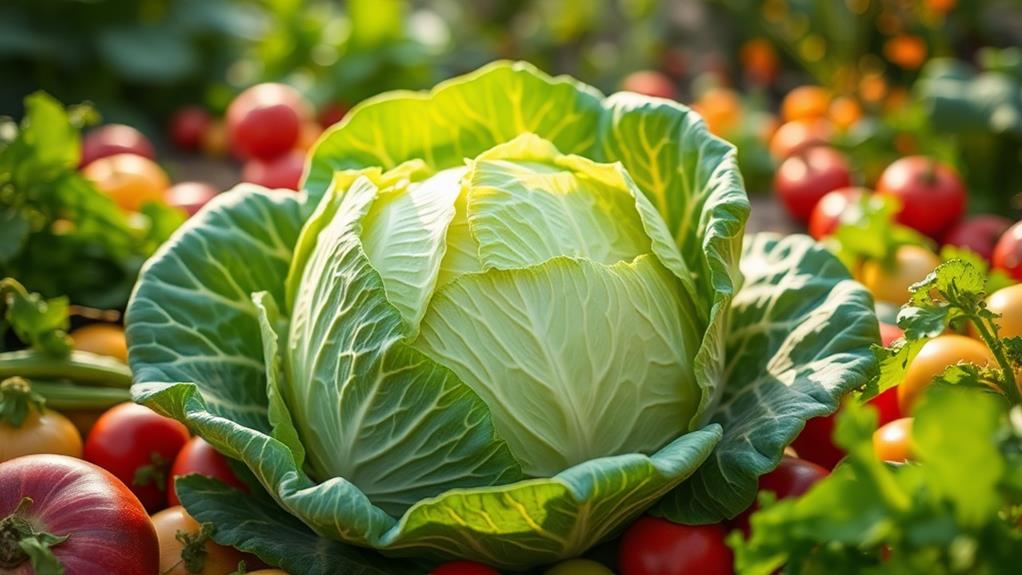
In addition to its heart health benefits, cabbage shows promise in cancer prevention. You might be surprised to learn that this crunchy veggie is rich in antioxidants and phytochemicals, making it a star in the fight against cancer.
Cabbage contains sulforaphane, a powerful compound that helps eliminate potential carcinogens from your body. This means it can help protect you from harmful substances that might lead to cancer.
Moreover, glucosinolates found in cabbage are linked to reduced tumor growth and may even boost your body's defenses against cancer.
If you enjoy red cabbage, you're in luck! It's packed with anthocyanins, which have been shown to slow down cancer cell growth in lab studies.
Eating more cruciferous vegetables like cabbage can lower your risk of certain cancers, especially colorectal cancer.
Fermentation Advantages
Fermented cabbage, like sauerkraut and kimchi, offers a host of health benefits that can greatly enhance your well-being. You might be wondering how this tasty treat can work wonders for you. Well, fermented cabbage is packed with probiotics, those friendly bacteria that boost your gut health. They help your body maintain a balance of good bacteria, making it easier for you to digest food and absorb nutrients.
When you enjoy fermented cabbage, you're not just adding flavor to your meals; you're also supporting your digestive function. It can help ease symptoms of digestive disorders and even keep constipation at bay. Plus, those probiotics can give a boost to your immune system, helping you stay healthy and fight off those pesky colds.
But wait, there's more! Regularly eating fermented cabbage might help with your mental health, too. Studies suggest that probiotics can help reduce anxiety by strengthening the gut-brain connection.
Culinary Versatility

While you might think of cabbage as just a humble vegetable, its culinary versatility makes it a standout ingredient in many dishes. You can enjoy cabbage raw in salads and coleslaw, where it adds a crunchy texture and fresh flavor, all while packing a punch of vitamin C and health benefits.
When you're in the mood for something warm, try cooking cabbage in soups, stews, or stir-fries. It's amazing how this versatile veggie can transform flavors while still delivering essential vitamins and antioxidants.
Don't forget about fermented cabbage dishes like sauerkraut and kimchi! They not only taste great but also bring probiotics to your plate, promoting gut health and digestion.
Plus, cabbage can serve as a low-carb wrap alternative, making it a nutritious base for sandwiches without piling on the calories.
Best of all, cabbage is affordable and has a long shelf life, making it a budget-friendly staple in your kitchen.
Whether you're whipping up a quick meal or experimenting with international cuisines, cabbage helps you embrace dietary diversity while keeping things fun and tasty!
Historical Significance
For thousands of years, cabbage has been an essential part of human diets and health practices. Ancient civilizations like the Greeks and Romans didn't just enjoy cabbage for its taste—they also used it for medicinal purposes! Imagine munching on a salad while knowing it could help with digestive issues. That's the power of cabbage!
Throughout food history, cabbage has played a crucial role in many cultures. Dishes like sauerkraut and kimchi show how people preserved this vegetable, making it a tasty staple that lasts. It's fascinating how something so humble can be a hero in our kitchens!
Cabbage has also been cultivated across various climates, contributing to food security. This means that even when times get tough, cabbage can still grow and feed people. Who knew this leafy green could be such a reliable friend?
With archaeological evidence suggesting cabbage was cultivated in Europe as early as 600 BC, it's clear that this vegetable has a rich history in agriculture.
Risks and Considerations
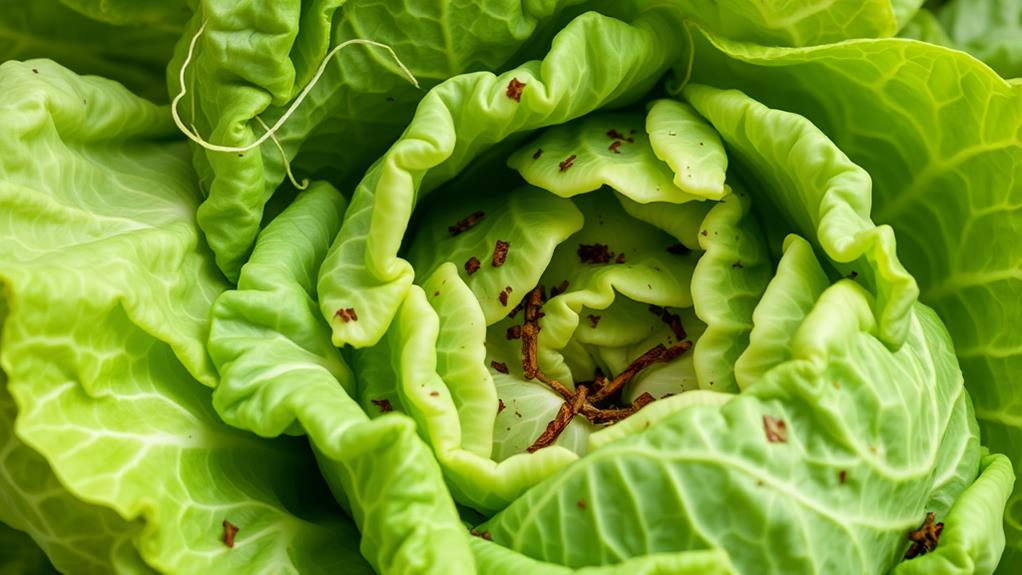
Cabbage can be a healthy addition to your diet, but it's important to be aware of some potential risks and considerations. While it's packed with nutrients, eating too much cabbage might lead to digestive discomfort, like gas and bloating, especially if your tummy is sensitive.
Cabbage contains goitrogens, which can interfere with thyroid function if you eat it in large amounts. Cooking cabbage can help reduce these compounds, so don't worry too much!
If you're on blood-thinner medications, like Warfarin, be cautious with sudden increases in vitamin K intake from cabbage, as it can affect how your meds work.
Some folks might even have allergic reactions to cabbage, but that's pretty rare.
Plus, if you've heard of the Cabbage Soup Diet for quick weight loss, remember that it can be impractical and lead to weight regain once you return to regular eating.
